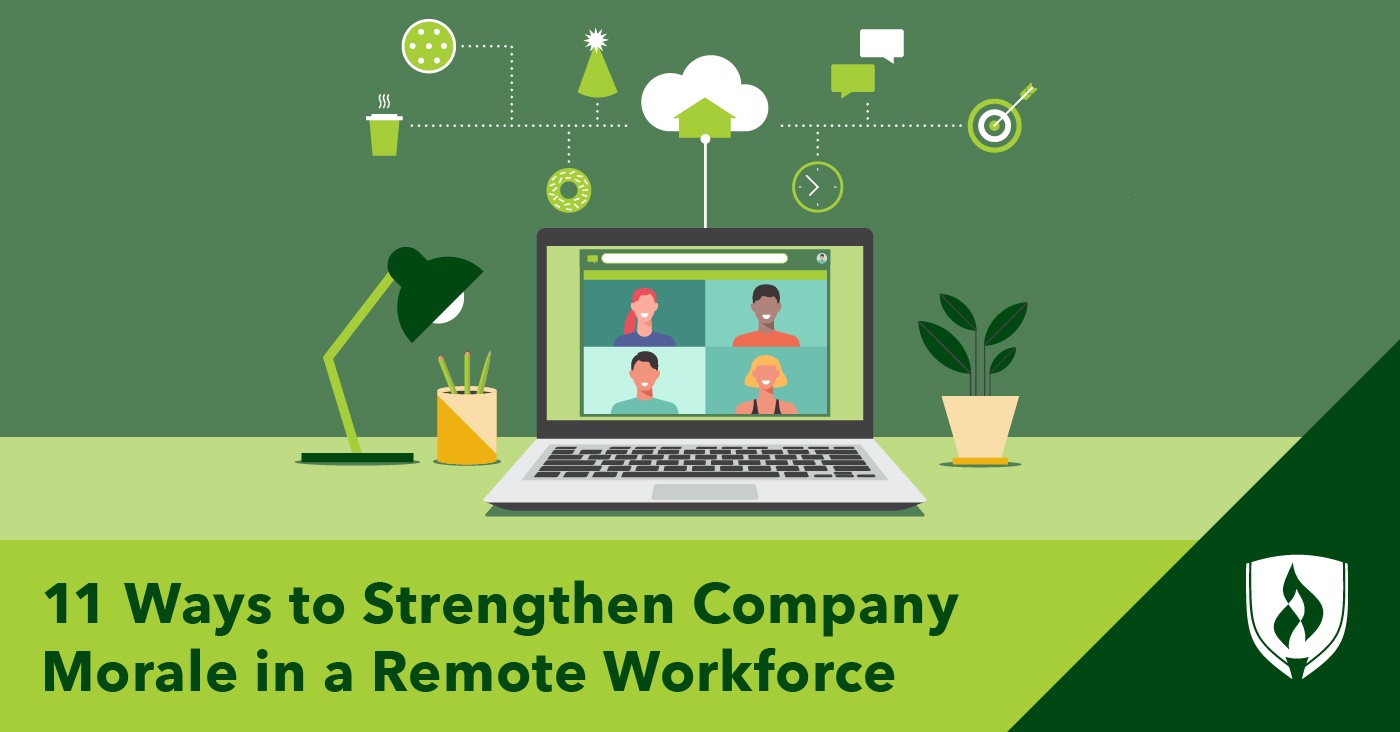11 Ways to Strengthen Company Morale in a Remote Workforce
By Brianna Flavin on 03/22/2021

Since 2020, what “going to work” looks like has drastically changed for a large portion of the country. In the first months of the coronavirus pandemic, 51 percent of employees surveyed by Gallup were “always working remotely.”1 The impact of that shift gave thousands of companies and managers a crash course in managing remote teams.
As you might expect, virtual teams have their own unique challenges. Employees working remotely face the need to remain productive and collaborative without the easy social interactions and routines an on-site environment typically provides. While many may enjoy their new remote work arrangements, losing out on some of the person-to-person connection can make employee morale a little trickier to manage. Those well-timed donut shipments on weeks where the office could clearly use a small pick-me-up are mostly out the window—so how can managers or even team members strengthen company morale remotely?
As experts everywhere are wondering if a much larger remote workforce is here to stay, business professionals and managers are giving serious thought to how their company culture works long-distance. “As companies lose ‘water cooler’ talk, employees’ average social interaction can be down as much as 50 percent,” says Rishav Khanal, CEO of inPerson. Khanal points out that many employees feel depressed or disconnected as decreased social interaction wears on.
“We have to remember employees are people with feelings, desires and needs. They're not robots you can put in a closet and say, ‘Now go be productive,’” says Brian Robben, CEO of Robben Media. He says investing real effort into how employees are feeling and functioning yields measurable results. “When everyone is pushing each other in a healthy way, revenue and profits soar.”
With that in mind, we asked managers on remote teams to share some of the strategies and ideas they’ve implemented to help strengthen employee morale and keep productivity in a good place.
11 Tactics for keeping morale up in a remote work environment
1. When in doubt, overcommunicate
“To raise morale, you have to develop trust and compassion above all else,” says Paige Arnof-Fenn, founder and CEO of Mavens & Moguls. This all comes down to communication. “I try to set the tone upfront with one rule—when in doubt, overcommunicate.” In a remote workforce, this means regular emails and video and conference calls.
If the lines of communication are open with everyone making an effort to both listen and be heard, collaboration happens naturally, Arnof-Fenn explains. “I am trying to help my team to be flexible and open-minded. If small groups on the team want to talk through specific issues, like managing anxiety, kids, parents and so on, virtual coffee meetings online have been helpful too.”
2. Open virtual working sessions
“Our team has two virtual working sessions per week, where team members can hop on a video call and experience the environment of the office and being able to roll back their chair to propose a thought to the group,” Khanal says. These open working times have no set agenda but allow team members to be in each other’s presence during the day. Khanal emphasizes that people can come and go as needs and projects demand.
“As a company that was born online, we struggled to find a way to keep team members engaged. This has made all the difference.”
3. Keep the “coffee run” alive
Grabbing a coffee with a manager or coworker can be such a vital way to connect. Trond Nyland, founder and CEO at Cordless Drill Guide decided to recreate this experience remotely by purchasing prepaid cards that he tops up from time to time. “This way it’s me paying for their coffee! Now it’s just take-away drinks, but we are still all together on the screen.”
4. Offer cash bonuses
Who doesn’t love cash? “The easiest way to boost employee morale and connectivity is to offer a cash bonus for the company hitting a goal and for individuals hitting a specific goal,” Robben says.
While your ability to implement this may depend on the employer, a financial incentive for a team collaboratively meeting a stretch goal is a nice option to keep in mind—working remotely or not. “Everyone will get focused for more cash,” Robben says.
5. Theme your virtual meetings
If virtual meetings are starting to feel rote and disengaged, why not shake things up a little? “Depending on the day or week, we have themed meetings,” Nyland says. “We will have our Christmas party with our Christmas jumpers, Halloween dressed up in costumes, hat day wearing hats and so on.” Nyland says the excitement of finding something to wear, mixed with the anticipation of seeing colleagues dressed up, truly distracts from the fact that everyone is long-distance.
6. Host online events
In the same way that your company might have thrown various parties or events through the year, get creative and find good options for creating the experience online. “Typically, we have lunch together as a team once a month during normal times,” says Mike Begg, cofounder of AMZ Advisers.
“To make up for that, we’ve tried some online events that the team has loved, like virtual cooking classes.” Giving everyone an opportunity to have some fun together can really increase company morale.
7. Encourage your team to take time off
“Encourage people to take breaks, and really mean it!” says Massella Dukuly, facilitator at LifeLabs Learning. “There is a major struggle when it comes to work-life balance. Remind people to step away from their computers, eat lunch and use their vacation days. Hold them accountable.”
When the line between work and home is blurred, it can be really easy for employees to burn themselves out by always being “on.” Organizations are well served to foster a culture that respects boundaries and is mindful of the need for employees to recharge.
“Give yourself permission to say no,” Arnof-Fenn encourages her team—as well as herself. “Whether it means sleeping in, meditating, taking a walk or just turning off your phone and computer, simple acts of letting yourself relax and enjoy the moment are the very best gifts.”
8. Ensure fair treatment
No strategy to boost company morale will work if employees don’t believe they are treated fairly. “The one thing we always rely on is equal and fair treatment,” Begg says. “If someone asks for something, we go out of our way to try to help them—whether it be more time off or whatever they need.”
This also comes across in the fine print. Meghan Tocci, marketing manager of SimpleTexting, says she’s learned that company culture is about far more than perks and ping-pong tables. “We've been a remote workplace since long before COVID. Without traditional face-to-face communications, remote teams need to see the culture demonstrated through words and action.” Tocci explains that things like healthcare and benefits policies and access to information are vital components to company morale.
9. Dedicate time and virtual space to fun
“When you work in an office, company culture can be an organic process; your people see each other face-to-face, and so they naturally develop culture, relationships, inside jokes and more,” says Michael Alexis, CEO of TeamBuilding. Remotely, more intentionality is needed. “I recommend the eight-percent rule. You should spend eight percent of your time on every virtual meeting focused on fun activities, like icebreaker games. If you make this effort, you can build a robust company culture online.”
Whatever platform your team uses to stay in touch, try to dedicate a few avenues for non-work conversation. Tocci says her company devotes Slack channels to family news and photos and book clubs. “It’s encouraged us all to hold valuable space for personal communications without limiting it to a predetermined time. It’s like a virtual water cooler!”
10. Take responsibility for disengagement
When employees are disengaged or falling behind, managers need extra intentionality. “Take responsibility,” says Laurie Wilkins, founder of Call Outdoors. “Before I ‘remedy’ the situation with the person, I will ask myself how the company may be failing the employee. I find that this allows me to identify potential stumbling blocks for the individual, such as poor or insufficient training, lack of support, too much or too little work or work that is not engaging enough for the person.”
After you ensure employees have what they need, Alexis advises managers to look for opportunities to add a little joy to everyone’s workday. “Send praise, award a small bonus, do a quick non-work-related video call or similar. If your people are disengaged, it’s not their fault—it’s yours, and you need to do something about it.”
11. Show understanding and compassion
It can be harder to remember that everyone on your team faces a wide variety of personal challenges when you don’t see them in person. “Be understanding,” Khanal says. “2020 will one day fill pages of history textbooks. For the foreseeable future, we see that employees need a bit of breathing room to get their routines right.”
“It’s important to normalize and acknowledge the fact that things are hard for so many right now,” Dukuly says. “Get curious, and truly listen to your team. Ask how they’re feeling.” Dukuly adds that uncertainty and large stressors aren’t going to disappear overnight, so it’s important to expect and affirm incremental changes.
“Don't be afraid to be vulnerable yourself. Be gracious, be flexible and be as transparent as you can.”
Great managers are priceless!
As you can see, managers in a remote workforce need to be creative, flexible, compassionate and strategic. Every company and every team of employees will have their own unique challenges and nuances. Managers who can adapt and help their teams thrive in any circumstance are extremely valuable assets to their companies.
Whether you are working in management or hoping to someday, you might be interested to see that the qualities of a truly great manager don’t always look like you’d think. Check out “5 Managerial Qualities You Didn’t Know You Already Have” for more.
Related Articles:
1Gallup, COVID-19 and Remote Work: An Update [accessed February, 2021] https://news.gallup.com/poll/321800/covid-remote-work-update.aspx




